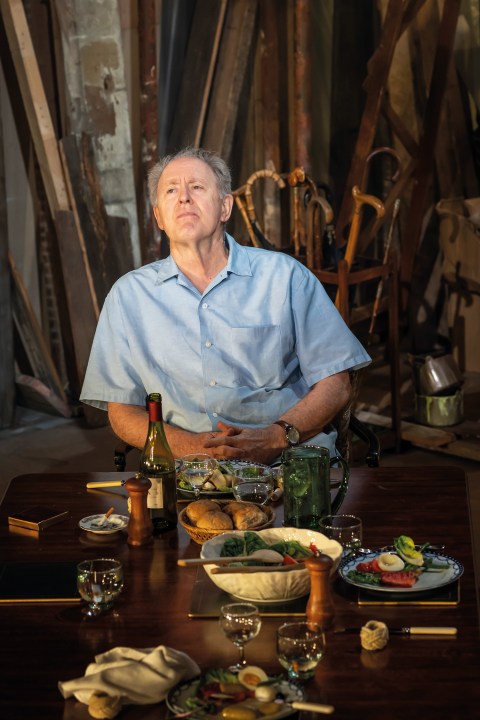
Two hours of yakking about Israel. That’s all you get from Giant at the Harold Pinter Theatre. Endless wittering laced with venomous bigotry. The year is 1983 and the celebrated kiddie author, Roald Dahl, has kicked up a massive stink by denouncing Israel for attacking Lebanon in late 1982. His latest scribble, The Witches, is about to be published in America but a handful of bookshops are threatening to boycott his work. Tom and Jessie, two executives from Dahl’s publishing firm, visit him at home and beg him to withdraw his anti-Semitic rant. Dahl refuses because he loathes the Jews, hates Israel and endorses all the usual myths about Jewish control of politics and finance.
The first act of this static, scruffy play is a tiresome debate about Israel’s existence that culminates in a screaming match. Act Two is a disorganised attempt to tie up the loose threads laid out in Act One. The playwright, Mark Rosenblatt, amplifies the drama with a cast of six which includes three superfluous cameos. A chirpy blonde scullery maid from New Zealand who knows how to chop lettuce. A thick odd-job man, called Wally, who keeps shuffling in and out and saying things like ‘I don’t know much’ in an oo-arr accent. And a fawning bombshell of a girlfriend who hopes to marry the rich old scribe.
The substance of the play is borne by the publishing executives, both Jewish, who discuss the Middle East with Dahl over lunch. Jessie (Aya Cash) is a shrill hysteric who represents militant Zionism. Tom (Elliot Levey) is a vacillating enabler who stands for prosperity, silence and an easy life. The production clearly prefers likeable weaklings to troublesome Zionists. And the audience is expected to agree.
As a work of drama, the stakes are far too low. Nothing matters very much to anyone. Does Dahl care if he’s denounced as a Jew-baiting bigot? Not really. Are his publishers worried that The Witches may sell poorly in America? A bit, yes. Might his lover, Felicity, feel miffed if the controversy leads to the cancellation of her 66-year-old boyfriend’s knighthood? Well, she might feel miffed about it. Then again she might not. The material has the air of office gossip elevated into drama. And the arguments about the Middle East sound like the rabbitings of sixth-formers at a hate march.
Perhaps the canny director, Nicholas Hytner, has set out deliberately to give anti-Semitism a bad name. If so, he has scored a triumph.
Dahl comes across as a charmless, self-righteous bully who invites a pair of colleagues to lunch and then attacks them with tawdry insults. A writer of Dahl’s talent should be able to coin a more imaginative label than ‘witch’ or ‘dragon’ for Jessie. But he can’t. He lacks any imagination. Nor can he discover the causes of his own bigotry.
The play offers no answers either. The only dramatic moment comes when Jessie rounds on the author and calls him a ‘big nasty child’. She tells him that his sadistic cruelty has driven his professional success but blighted his personal life. Spot on. It’s a shame that Dahl has less self-knowledge than his publisher. John Lithgow, as Dahl, gets the British accent right occasionally. He has no trouble with oddities like ‘tickety-boo’ but his stabs at simple phrases like ‘I remember’ or ‘better off’ are less successful. He portrays his subject as a lugubrious elderly gorilla who hobbles around on a walking stick, complaining of stiff ankles and fretting about his underpowered libido. He needs painkillers to pep up his performance in bed, he tells us. His beautiful lover, Felicity (Rachael Stirling), looks like a brain-dead nurse hired to whisper sweet-nothings into the ear of a spiteful old miser.
Parlour Song is Jez Butterworth’s forgotten play. It premièred in 2009 but it was eclipsed the following year by his international hit Jerusalem. The setting is a cul-de-sac in the West Country where a luke-warm affair develops between two next-door neighbours. Ned is a demolition expert whose marriage to Joy has grown cold. They’re incapable of rekindling the spark, and their stilted and repetitive dialogue sounds like a long excerpt from Abigail’s Party.
Joy takes a fancy to her neighbour, Dale, and she makes advances to him in coded language using the word ‘lemon’ for sex. Dale takes the hint and delivers the lemon. These scenes feel like riffs on themes established by Pinter in The Homecoming and Betrayal. A play that self-consciously revels in the work of earlier dramatists is a treat for literary trainspotters who know the canon of 20th-century theatre. But newcomers may find it too slow to begin with and too rushed at the end. Among the cast, Kellie Shirley’s Joy stands out. The set, a vast array of shelves loaded with knick-knacks, steals the show.









Comments